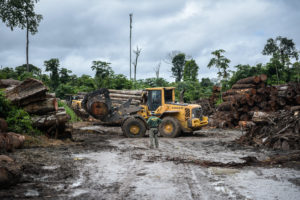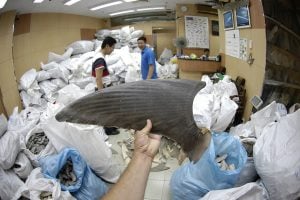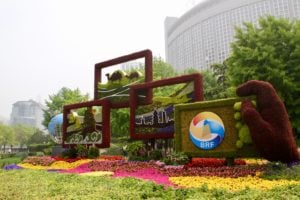Jamaica’s environmental regulatory agency has issued 16 enforcement orders against Chinese state-owned mining giant Jiuquan Iron and Steel Company (JISCO) for non-compliance with environmental regulations.
The news comes weeks after Diálogo Chino revealed that air pollution from the company’s aluminium-to-bauxite plant has left scores of residents in its immediate vicinity with various respiratory illnesses, rising health care costs and reduced access to clean water.
Peter Knight, CEO of the National Environment and Planning Agency (NEPA), said JISCO’s non-compliance has created serious environmental and human health issues, “requiring strategic and planned intervention, monitoring, and enforcement”.
Poor management
The source of the problem is a 350-hectare residue disposal area that JISCO has been accused of managing poorly and in breach of its environmental permits, Knight said.
“Monthly assessments are done by the agency’s technical and enforcement teams. JISCO has been served over sixteen enforcement instruments spanning last year and the present month for non-compliance.”
Since Diálogo Chino’s initial report on March 22, it has also been revealed that NEPA granted the mining giant an independent license to record its own air quality tests.
A senior official at NEPA said JISCO currently has 11 air quality monitors in the vicinity of the plant, which also covers the residue disposal area. Monitoring activities are carried out around the clock.
The official, speaking on condition of anonymity, said records are submitted to the environment agency on a monthly basis.
The environment is a common heritage of mankind everywhere, it’s your duty to protect it
NEPA said the agency has seen spikes from JISCO’s own records, which it said would be difficult to tamper with because it has a comprehensive auditing system.
The official told Diálogo Chino that NEPA does not have the capacity to properly monitor the JISCO plant due to lack of funding for its Air Quality Management Programme.
$256,000
the maximum cost to Jamaica's environmental regulator of procuring air quality monitors
It would cost the agency between $JA6 million (US$46,000) and $JA33 million (US$256,000) to procure a single air quality monitor device similar to the ones being used by the Chinese company, the source said.
The official also indicated that plans are already underway to develop the Agency’s air quality management programme but noted that it would take at least a decade to be completed.
Chinese Ambassador weighs in
Meanwhile, Tian Qi, China’s ambassador to Jamaica, has called on JISCO to carry-out ‘green cooperation’ in its local mining activities. Speaking on the sidelines of a recent event where Jamaica formally endorsed China’s Belt and Road Initiative, Tian Qi said JISCO must do more to protect the environment.
“We ask them to do everything to protect the environment and to get along well with the local community, that means to do [sic] more feedback with the local communities,” he said.
“The environment here in Jamaica belongs to the Jamaican people, it also belongs to the whole human race. The environment is a common heritage of mankind everywhere, it’s your duty to protect it.”
The JISCO Group is no stranger to environmental enforcements. Back in China, records from the Beijing-based Institute of Public & Environmental Affairs (IPE) show that between 2016 and 2018, JISCO committed or is suspected of committing 16 environmental infractions.
In 2016 and 2017, following tougher enforcement of environmental laws, one of its companies, the Gansu Dongxing Aluminum Industry, received a C rating in its environmental credit assessment. The company was the only large industrial enterprise to receive a C in the whole of Gansu province in 2016.
Exporting industries – and pollution
In the past few years, as growth slowed in China and Premier Li Keqiang’s ‘war on pollution’ intensified, China has begun exporting its industrial overcapacity to external markets.
This involved developing heavy – often high-polluting – industries with many of its trading partners, with supposed mutual benefits. A Chinese ministry of foreign affairs’ 2016 policy paper pledges to develop “production capacity” in Latin American and Caribbean countries.
In China, officials reduced aluminum smelting and refining primarily to protect air quality. Yet companies also secured new plants overseas to enable them to keep growing.
$3billion
the amount Jisco plans to invest in Jamaica's economy
When the Alpart refinery reopened in 2016 under JISCO’s ownership, company officials announced plans to invest more than US$3 billion in the Jamaican economy, promising to build an industrial park, which would include a second refinery.
The company announced that they planned to begin developing the park in January 2019. They have not yet broken ground on the project.
Jamaican local media reports that JISCO chairman, Chuming Chen, has stood down, leaving the future of the Jamaican plant in limbo. Chen had taken a keen interest in the industrial park project. Government insiders have told Diálogo Chino that the incoming chairman of JISCO, who has not yet been announced, will visit Jamaica in the summer.
Government sources also indicated that the new chairman has instructed JISCO’s management to fast-track a relocation plan for residents affected by the plant’s pollution.
Ten residents are expected to be relocated before the end of this year.
Diálogo Chino understands that at least one of the residents is cautiously positive about the prospect of relocation.








